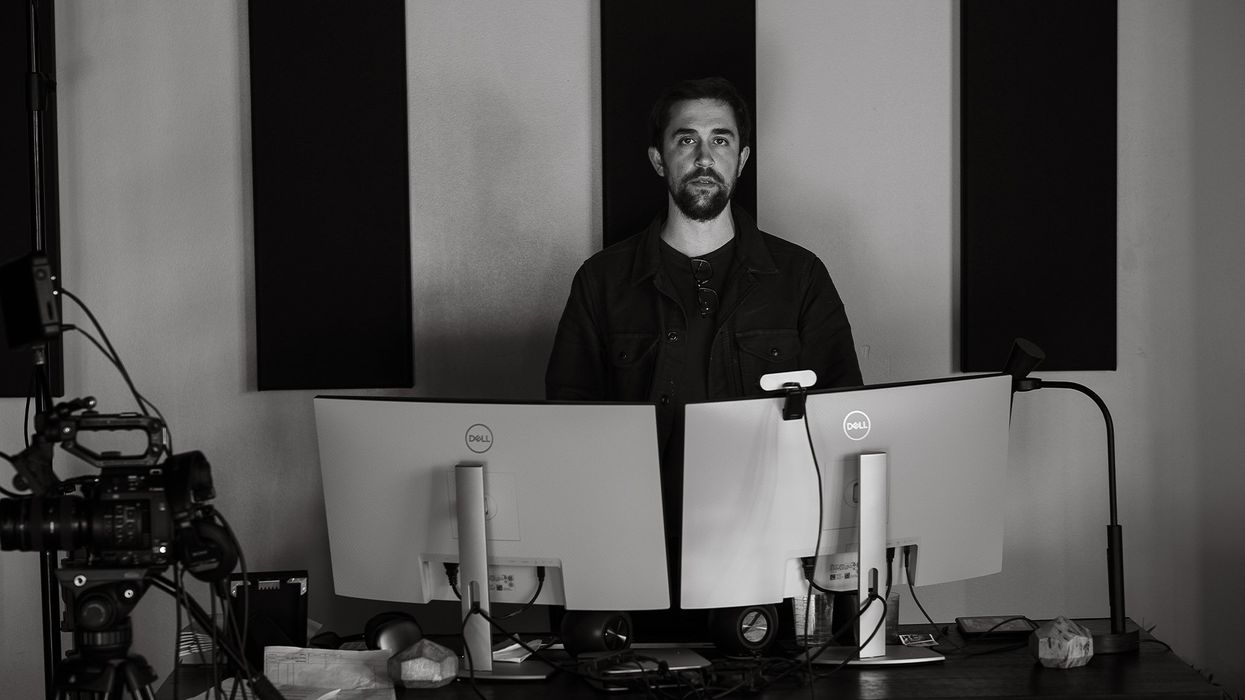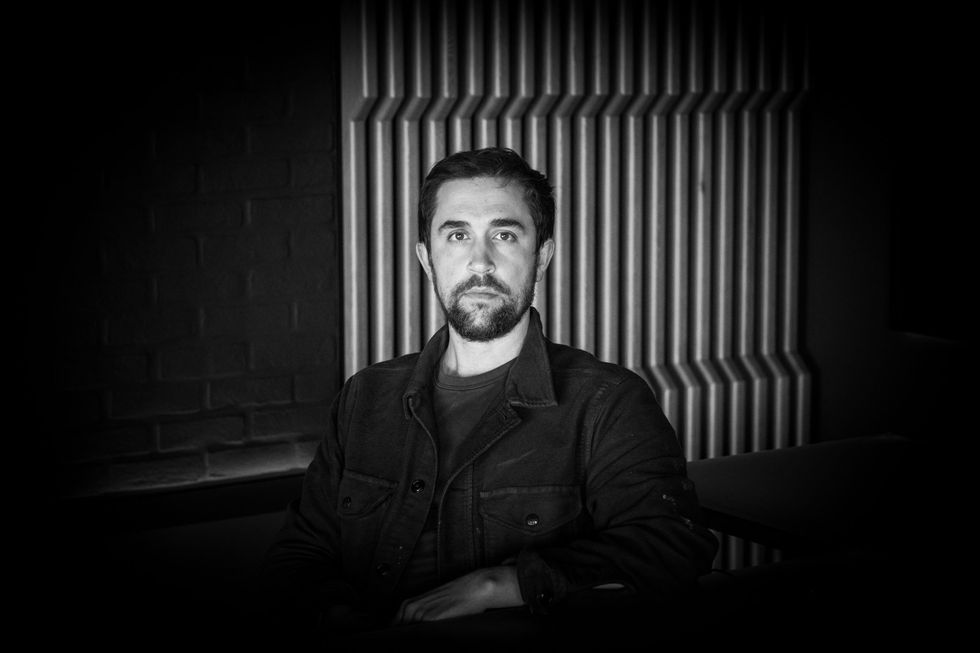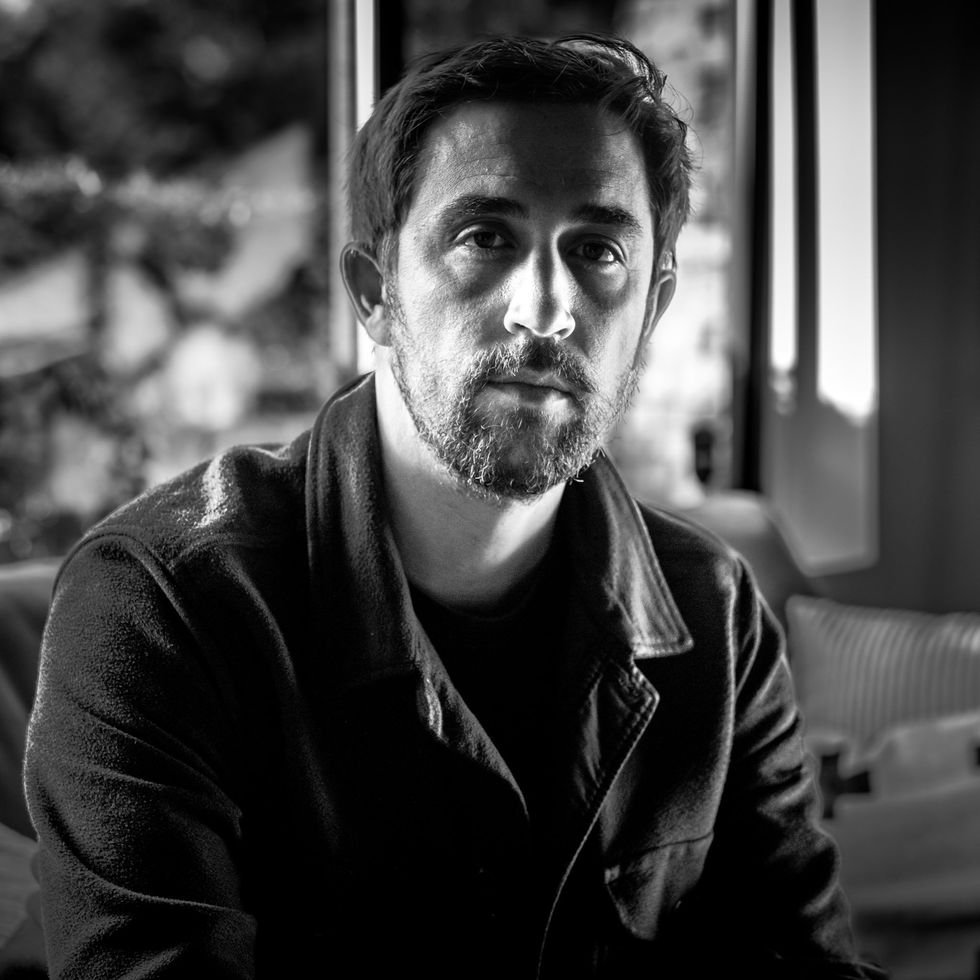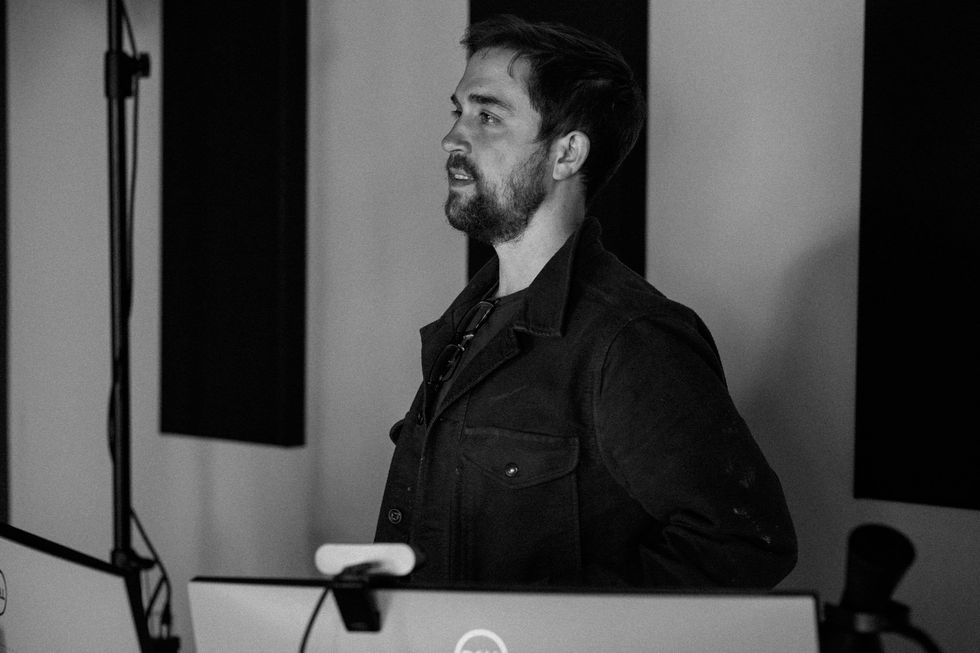
Peter Gietl

A modern muckraker sets his sights on the establishment.
Chris Rufo is running late, so I decide to take a walk around the Gig Harbor pier. This achingly beautiful maritime village (pop. 12,000) is perched on Puget Sound. When the sun breaks through the fog, you can see the colossus of Mount Rainier reigning over the vista. The forest descends from the mountains to the water’s edge in waves of ancient green.
“I call myself a conservative but I only use the term conservative as a term of convenience. When you say I’m a conservative, people automatically make associations to figure out where you are, who your allies are, who your enemies are. I think my actual politics are anything but conservative.”
The town seems like a mix of wealthy retirees and locals desperately holding on, mingling with tourists on a day trip—a life raft of tranquility and nostalgia in a sea of modernity. The vibe is entirely different from Seattle’s corporatized anarchy an hour away. It’s not where you would expect to find a radical fighting an insurgent guerrilla action against an entrenched regime. But Christopher F. Rufo is not your typical conservative.
I arrive at Rufo HQ, located in a nondescript office building a few minutes from the center of Gig Harbor, and I am a bit bewildered. It’s small, perhaps even tiny, compared to what I expected. It’s a humble room housing a couch and a couple of desks with a camera and lighting. This vestibule launched a thousand Substack think pieces and a million tweets, shaking elite academia to its rotten core?
I’m doing the interview a few months after Rufo unleashed a political earthquake with Claudine Gay and the Harvard plagiarism scandal. It was one hell of a story, hitting some major themes of current American discourse: race, critical race theory, DEI, wokeness, and the Israel-Gaza war protests. At its core was a populist takedown of out-of-touch elites that resonated with everyone from MAGA uncles to Wall Street billionaires.
While I wait for Rufo to return to the office, I chat with Armen Tooloee, his chief of staff/ assistant/bodyguard, and consigliere. A young man with a smiling demeanor and intensity in his eyes, Armen has a beard so well groomed that even the New Yorker mentioned it in their obligatory hit piece. I try to get a sense of the operation, but he said it was just himself, Rufo, and the contractors they bring on when they need help. Armen exudes loyalty and purpose, which is precisely what you want in a lieutenant.
Rufo bursts into the room in a flurry. He’s on the phone, loudly discussing a recalcitrant board member he was butting heads with at New College in Florida. The small, emphasis on liberal, arts college in Sarasota had in 2023 experienced a hostile takeover by Governor Ron Desantis, who helped install a new board of trustees, causing a third of the faculty to quit or be fired. A bit of irony was involved in listening to a man who had built a career fighting academic bureaucracy but was now enmeshed in the minutiae of running a college.
We decide to grab lunch, and Rufo drives me in his old truck to a local watering hole called Tides Tavern. Over salads and iced tea, I get a vague sense of who he is. A lithe man, Rufo exudes an intense, almost manic energy. He paces, and his mind seems to race from topic to topic, but when he focuses, you notice it. I’ve done quite a few interviews over the years, but this was the only one I recall where the subject asked me nonperfunctory questions. He was curious about my thoughts on various things, from Silicon Valley to the upcoming election. He seemed to be probing, looking for bits of information he could use to advance his mission. We bonded over our love of travel, being elder Millennials (we’re the same age), and the best guard dog breed. With a young family and an army of Antifa pseuds trying to dox his home address, it’s an important question. We agreed you can’t go wrong with a German Shepherd or a Rottweiler, although I prefer a Great Pyrenees.

Every villain has an origin story. To the establishment, Rufo has made himself a confirmed irritant. But he didn’t start as a political activist. His father was an Italian immigrant, and he had a middle-class upbringing in Sacramento, California.
“We were lucky to grow up in that era. You had the end of the Cold War. We had defeated the evil empire. The country had this massive peace dividend, people’s fortunes were rising, and it still felt like there was a cohesive culture.”
A chance encounter while studying at Georgetown led him to become a documentary filmmaker.
“I got sidetracked for 10-plus years with a documentary filmmaking career,” Rufo explains. “I really wanted to travel; that was an important thing for me. I wanted to have an adventure. I wanted to not have a boss.”
His early documentaries are quite good. In Roughing It: Mongolia, he wanders through the Gobi Desert interviewing shamans and reindeer herders; in Diamond in the Dunes, he travels to Xinjiang to follow a Chinese baseball team. However, America Lost showcased a more assured filmmaker, stretching beyond the mere travelogue into questions about the American soul. Rufo spent five years documenting people’s lives in the forgotten cities of Youngstown, Ohio, Memphis, Tennessee, and Stockton, California—once great industrial centers sacrificed to the gods of globalization. The film portrays the dramatic decline of the American heartland: an ex-steelworker scrapping abandoned homes to survive, a recently incarcerated father striving to rebuild his life, and two sisters yearning to escape their blighted urban neighborhood.
“It was a profound experience. A lot of left-wing Brooklyn-dwelling elite opinion journalists talk about the oppressed in completely abstract terms and have never spent a single minute engaging with these people.”
He decided to go out and document the rot most of us are only too happy to ignore.
“I was hanging out in the basement with a bunch of heroin addicts and a gal who you know turns tricks to pay for drugs. I was hanging out with the mobsters that run the strip club,” Rufo recalls.
What is unique about America Lost is how it ends not with nihilism or a call for more government programs but rather an appeal to heaven.
“I learned that the only thing that actually works in those communities, tangibly, that you can see with your own eyes, is spiritual in nature. It involves faith, religion, organic social institutions, and irrational phenomena that I wasn’t even looking for when I started. But by the time I finished making the film after five years, I was persuaded that the only solution to all of these problems is spiritual.”
Directing a film like that had a tremendous effect on Rufo’s understanding of the world around him and how politics functions as a mechanism of power. He would rebrand himself as a conservative agitator against the status quo—a radical. Many would be content with a successful documentary career, but he embarked on a journey to take on the institutional powers he saw as responsible for these ills.
Chris Rufo went to the mattresses.

Rufo’s 2023 book America’s Cultural Revolution: How the Radical Left Conquered Everything is a fascinating study of academia that has had an outsized effect on the culture.
The book explores how Communist intellectuals regrouped, how people like Herbert Marcuse and the radical revolutionaries he cultivated realized it was a lot easier to take over the University of California at San Diego than it was, say, the city of San Diego.
It’s not a particularly original book. Conservatives have been decrying the long march through academic institutions for decades, but for whatever reason, it has resonated with readers in a way previous attempts have not. I suspect it’s Rufo’s preternatural ability to distill the postmodern jargon of Marcuse into a coherent narrative. One that explains why people saved their whole lives to send their kids to college, only to have Sally or Jimmy return as raving Maoist foot soldiers. Rufo’s critique is also much more profound than any “Democrats-are-the-real-racists” or similarly mindless talking points. It touches on power and who can wield it.
“I think the book succeeded largely because people have been asking those questions for a while because it’s affecting them and their children. I told an old story with the updated approach of a storyteller.”
We talk for a while about the Harvard controversy. In some ways, Rufo seems disoriented by it all. By this point, he had written tens of thousands of words in tweets and articles about it and participated in dozens of interviews. He tells me he had no idea the story would go viral. Rufo had been toiling away trying to find ways to hold academia and the racial bureaucracies to account when the story struck like a supernova. It’s one thing to be a writer dissident right-wingers enjoy. It’s another thing when Elon Musk is retweeting you, and Bill Ackman is calling you up. I ask him what his most significant takeaway was with the benefit of some hindsight.
“I think it has signaled a critical cultural moment in which the left-wing ideologies that have been on the rise for 50 years finally discovered that there exists some outer limit. I don’t fool myself into believing that we’ve solved the problem. No, this is a symbolic victory primarily, but one that I think offers a way forward for a broader campaign.”
I feel the need to push back on this.
Rufo spent five years documenting people’s lives in the forgotten cities of Youngstown, Ohio, Memphis, Tennessee, and Stockton, California—once great industrial centers sacrificed to the gods of globalization.
Seeing an institution as corrupt and incompetent as Harvard thoroughly embarrassed is exhilarating! Collecting the scalp of someone as profoundly mediocre as Claudine Gay is great for headlines, but I couldn’t help but wonder if all this was merely a form of LARPing. Another middling DEI commissar will eventually replace Gay. Has anything changed? And what about the thousands of other universities advancing the same critical race theory goals? Would passing the Civil Rights Act Redux—“No-this-time-we’re-super-serious-you-guys can’t-be-racist-in-your-admissions-policies!”—make any difference? Rufo had a straightforward answer to this black-pill question while acknowledging private colleges like Harvard might be impossible to reform.
“A public university is a taxpayer-funded, publicly governed, and legislatively appropriated institution. There’s a direct one-to-one strategy to say we have an electoral majority. Our voters are demanding university reforms. We will write bills and reform the universities. The universities are a creature of the state and are subject to public oversight. That’s a relatively simple process.”
Rufo went on to explain his mindset in waging this fight.
“You can’t just have guerrilla-style warfare. We actually have to have a full mobilization on these culture lines and I think having symbolic victories makes that possible. One of the biggest lessons that I’ve learned is action always reveals possibility because you gain knowledge whether you win or lose. When you win, there’s a return because you open up new possibilities by having a victory. You have to build on small victories, and anyone who tells you you can have a single final total victory as long as you don’t do anything in the meantime. I just don’t find that persuasive at all.”

We talk late into the afternoon, and I want to pin down his goals for the future. With his newfound success and subsequent fundraising windfall, it would be straightforward to fall into a predictable pattern: write books and articles and give speeches to older crowds lamenting all the bad things the Left has been up to. Raise money. Rinse and repeat. It’s an easy strategy but one that has proved to be ineffectual.
“I just don’t have any desire and don’t think I even have the skill to build a big organization; that doesn’t seem exciting to me,” Rufo says while staring out the window into a wall of emerald forest.
“I don’t have a huge staff or overhead, so I can spend virtually no time fundraising. I like being light on my feet. I don’t want to get bogged down in bullshit, trapped in endless loops of meetings, where you get your projects delayed for days, months, and years until the point they’re irrelevant.”
When I asked him what exactly his goals were, Rufo was icily direct.
“I want to win,” he said, his voice rising.“ I think there are a lot of people in the general conservative world where I’m not convinced that they want to win or or want to take the risks necessary to win.”

I drive back to Seattle and drink a martini at the hotel bar, trying to make sense of Christopher Rufo the man. He is a study in contradictions, an academic who loves discussing Gramsci but who, like Gramsci, loathes academia; he is an artist and propagandist fighting against an immovable machine of popular culture. America used to produce these men, these consummate outsiders, in spades; perhaps they’ve also been outsourced.
We talked for a while about Antonio Gramsci, an early 20th-century Italian Communist philosopher. It might seem strange for modern conservatives to look back to a Communist for inspiration, but Gramsci is a fascinating writer. He explored the concept of Hegemony, defining how a ruling elite wields economic and cultural power over their subjects. Although directed at the capitalist class, his critiques of power resonate when thinking about the modern professional managerial class ruling us today.
“Strip out the economic theory and you just look at Gramsci’s cultural theories; his theory of the intellectual; his theory of education and you can even look at his theory of family and sexual relations and he’s very conservative,” Rufo explained.
Gramsci also railed against an intellectual class that was out of touch, unable to understand the aspirations and problems of the working class or produce anything of value. “Race theory departments and universities don’t have the capacity or the interest in running a Ford factory. They take it for granted and they just want to extract rents.” Understanding political power in this way is a radical departure from traditional conservative philosophy. However, it’s crucial to comprehend that almost all elite institutions have been captured, and a presidential election every four years won’t change that. It will take a more radical approach to politics, involving new ideologies and strategies to create a counter-hegemony to entrenched bureaucracy.
I opened the interview by asking if he considered himself radical. He took a very long pause, but his answer was telling.
“I call myself a conservative but I only use the term conservative as a term of convenience. When you say I’m a conservative, people automatically make associations to figure out where you are, who your allies are, who your enemies are. I think my actual politics are anything but conservative.”
Weeks before the interview, I drove to Boulder, Colorado, on a freezing February evening to hear Rufo give his critical race speech at a small lecture hall at the University of Colorado. A campus conservative organization invited him, but a conspicuous contingent of DEI professors visibly seethed as he spoke. They were polite enough to wait until the Q&A portion to register their disdain for his having the temerity to challenge their raison d’etre. They accused him of the progressive sins of denying systematic racism and silencing BIPOC voices. They wanted penitence but would find none this evening. He answered the angry questions with professionalism but also with apparent disdain, and I noticed the gleam in his eyes and the sardonic smile. Maybe it’s his Italian heritage, or perhaps he’s just an asshole, but Rufo clearly relished the combat. I know a knife fighter when I see one.
Peter Gietl is the managing editor of Frontier and Return. He lives in Texas.